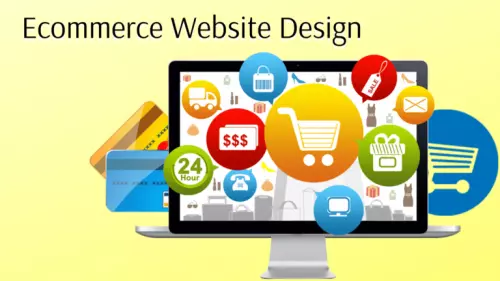Increased internet users and the favourable market creates a suitable environment for business growth. In 2018, India’s eCommerce industry market value was at 50 billion US dollars. It’s expected to grow up to 200 US million dollar by 2026
The statistic above gives you an insight of India’s eCommerce future which certainly looks bright as the sun! Now that you know about India’s Ecommerce Industry growth and future. Let’s understand what E-commerce is exactly!
What is E-Commerce?
E-commerce aka E-business is buying or selling of products/services through an electronic path like the Internet. The process involves setting up an E-Commerce website on which buyers/sellers can securely share data and transactions. In more human terms, it is nothing but online shopping. E-commerce has come a long way from 1960s Electronic Data Interchange (EDI) to today’s modern online shopping in 2020.

What is an E-commerce website?
There are different kinds and types of websites to serve and meet different business goals. An eCommerce, in particular, is created to sell or buy one or many products. E-commerce websites involve a secure exchange of information and funds between two or more parties.
The main advantage of an e-Commerce website is that it saves you the brick and mortar cost. Setting up a physical store may cost a lot of investment, time and other countless formalities. E-commerce websites allow you to start with what you have. It just likes your physical store but virtually. It does everything your store does. It guides the customer to products they are looking for, filters products out according to their budget, and takes them to the billing counter once they finalized what they want to buy. This virtual shop also allows your customers to buy products around the clock and from anywhere in the world because of which your reach is not just a limited local audience. Amazon, Myntra, Alibaba, Flipkart, eBay are some of the prime examples of what an e-Commerce website looks like.
Types of E-commerce website
E-commerce websites in itself have different types and kinds which serve a different purpose. These kinds are as follows:
Business-to-Business (B2B):
In this kind of e-Commerce websites electronic exchange happens between two businesses i.e. is business to business. In simple words, a business is selling its products/service to other businesses. For example, Dreamdesign provides its SEO services to other web designing companies.
Business-to-Consumer (B2C):
This is the most common kind of e-Commerce website people are aware of. In this kind of e-Commerce website, the electronic exchange happens between businesses and customers. In simple words, a business is selling its products/service to its customers and other individuals. For Example, You are buying products from Amazon aka online shopping.
Consumer-to-Consumer (C2C):
In this kind of e-Commerce websites electronic exchange happens between two customers, most likely through a third party. For example, You sell your mobile phone to someone on websites like eBay or OLX.
Consumer-to-Business (C2B):
In this kind of e-Commerce websites electronic exchange of products/services take place from a customer to a business. For example, Social media influencers promote brands, exposing the brand to a larger amount of audience in exchange for a fee.
Factors you must consider before using an eCommerce platform
Budget:
Initial cost of setting up your online store to make sure it’s fully functional
Ease: You should consider this factor especially if you are someone from a non-technical or have less knowledge of technical aspects
Payment gateways:
The reason you started your online store or eCommerce is mostly that you want to get something out of it. Make sure your platform has multiple payment gateways available to make sure you don’t miss out on orders because your portal did not accept Paypal.
Integration:
Make sure to check the number of integrated and third-party tools it allows you to integrate into your e-Commerce website.
Scalability:
It is the most important factor you should consider while using an eCommerce platform. As your business grows, the quality of your product sold will also increase. Make sure that the platform can scale up as your online business flourishes.
Most used E-commerce platforms
The above given is a graphical representation of most used eCommerce platforms
Woocommerce covers 21%, Shopify is the runner up with 18% and Magneto with 13%.

Our best picks E-commerce platform your online business
Now that you know what Ecommerce is and its types, let’s discuss the eCommerce platforms that will help you successfully establish your ecommerce store on the World Wide Web
WooCommerce
Developed by Automattic WooCommerece has become one of the most popular e-commerce platforms for big and small enterprises. It is an open-source plugin for WordPress websites. (Don’t worry WordPress is also a free website builder. The wow factor about this platform is that it is completely free to use to get you to kick start your online store. However, charges might apply to add new features. WooCommerce plugins turn your WordPress into a full-fledged e-commerce website. When it is fused with WordPress, it adds in features like product management, order processing, cart shopping functionality and more.
It has around 13 million downloads and over 37% of online stores use this platform to run their business effectively. The software has all the major features of an e-Commerce website like features like international customers, inventory management, sales tax management, shipping cost calculations, coupons etc.
Price:
- Mostly free, however hosting and additional plugins cost differs.
Pros:
- It is a free and secure and scalable open-source software
- It is fairly easy to set up this plugin into WordPress
- 300+ extensions to give your website a robust look
- Flexible functionality across different devices
Cons:
- Frequent software updates can be difficult
- Adds on/Plugins can be expensive
- Customization restrictions
- Does not have a centralized support
Recommended for:
Individuals that are tight on their budget and are fairly tech-savvy
Shopify
It is developed by a Canadian company Shopify Inc. It is a SaaS (Software as a Service) based platform. It has become one of the most favourite e-commerce platforms. It easily allows beginners, armatures and pros to set up their online store without the hassle of coding. It is quite straightforward because it serves more than 800,000 online stores and services. It has a wide range of ‘themes’ to match your brand personality and identity. It has three different subscriptions that help various big and small enterprises to set up their online business effectively. The pricing plans fit any size of the business, be it a growing startup or an established enterprise giant.
Price
Shopify provides 3 different pricing models to make sure it helps you set your online store perfectly.
- Basic Shopify: $29 per month
- Shopify: $79 per month
- Advanced Shopify: $299 per month
Pros
- It is integrated with Google Analytics, SEO and AMP(Accelerate Mobile Pages) that loads contents faster across devices
- No transaction fees for using its payment gateway
- Effective inventory system that helps you to keeps your online store organized.
- Sell across various other platforms like Facebook, Instagram, eBay etc.
Cons
- You have to use paid apps to use more plugins which can be a little expensive
- Exporting blogs is difficult because of a poor Content Management service
- Charges are applied for using a third party payment gateway like Paypal, Amazon pay etc.

Recommend for
It a perfect match for small business and medium scale enterprises
Magneto
Written in PHP, Magneto is one of the largest eCommerce platforms amongst other eCommerce platforms. It is more than just an e-Commerce website building tools. The platforms have features like order management, business insights and more. This is a perfected eCommerce platform for large enterprise as it has built-in scalability. Magneto is suitable for all kinds of industries but it works perfectly for businesses who are into Automobile, Fashion or Restaurant industries. Using this e-commerce platform will also make mobile ordering easy for users.
Price
Starting price: 1,988 per month
Pros
- It allows you to customize as per your requirement and achieve desired e-commerce functionality
- It has built-in scalability which is most suitable for large enterprises
- It offers a wider range of tools than other platforms
- Users experience hassle-free online shopping through mobile phone
Cons
- It can be a little out of budget
- Customization can be difficult because of complexity
- Has hosting and server issues
Recommend For
It is best for large enterprises who have a huge demand and supply of products or services.
Final Words
Ecommerce business has a huge pool of opportunities in India. It only grows more and more because of the increased number of internet users. Choosing an E-commerce platform for your website is difficult. We hope this article helps you make the most of it.
If you are looking for a website agency that helps you make your e-Commerce website a machine gun raining sales then contact us now! We are just a call away!!


